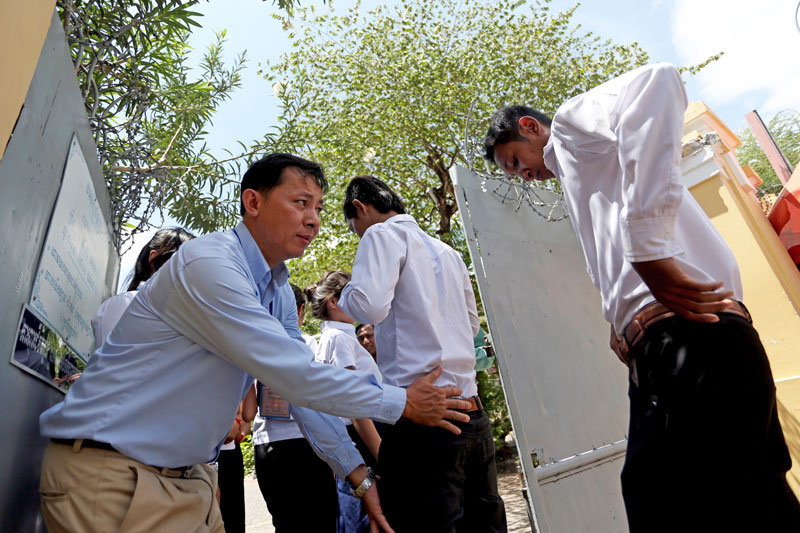The Education Ministry’s bid to rid the grade 12 national exam of cheating and bribery was hailed a success after the first day of testing Monday, with officials reporting only a few attempted cheats and no corrupted proctors.
“Corruption did not happen,” said Chhay Savuth, vice chairman of the Anti-Corruption Unit, which deployed officials to each of the country’s 154 exam centers.

Education Minister Hang Chuon Naron, who spent the day touring Phnom Penh schools, said there was “very good discipline, no cheating.”
“There was no reported cheating, only one attempt to bring a smartphone into the class and no papers brought into the class,” said Mr. Naron, who explained that he had received reports from “almost all” of the provinces.
However, a perfect record was blemished, according to Mr. Naron, by three cases of imposters attempting to sit the exam in the place of the registered student—two in Kandal province and one in Svay Rieng province.
“The monitors recognized that the ID did not match,” Mr. Naron said. “They will be disqualified from sitting the exam until 2017.”
The ACU, which for the first time this year was solicited to police the national exam, in March threatened jail time for cheats. But Mr. Savuth said Monday that the three imposters would not be charged with a crime and that the ACU was dealing only with “corruption, money changing hands in the classroom.”
A number of representatives of the Cambodian Independent Teachers’ Association who served as proctors also said that there was no cheating or corruption in classrooms. However, San Chey, a fellow with the affiliated Network for Social Accountability in East Asia, which provided 80 of the ACU’s 2,000-plus observers, said otherwise.
“In terms of cheating, there was a few examples of students reading documents in the exam room,” Mr. Chey said, adding that his observers had notified the stationed ACU official at each school.
“After that, we don’t know what happened. We just report to the ACU and they proceed.”
While the Education Ministry and the ACU said that proceedings inside the schools were mostly aboveboard, outside was a different scene.
In Phnom Penh, military police patrolled the fringes of schools as students rushed in and out of print shops, making copies of handwritten cheat sheets, photographing them on smartphones and sharing them on Facebook.
Peddlers openly distributed small sheets of paper, but tucked them away when asked questions by reporters.
Across the road from the Chea Sim Santhor Mok high school in Tuol Kok district, the Makod Pich Thmei Photo Studio ignored orders by commune officials not to run its photocopiers on exam days, as did about 10 other similar shops in the area.
In Takeo province, however, provincial police raided a copy shop and arrested two men, according to the ACU’s website. The men were found to be selling the answers to five of the 10 national exam subjects for $100, according to the ACU.
In the lead-up to the exam, Education Minister Mr. Naron had warned students of fake cheat sheets, explaining that it was impossible for the exams to be leaked.
Outside Sisowath High School in Daun Penh district, Chuon Sambath waited for his brother to complete the morning’s chemistry and biology portions of the exam.
Mr. Sambath, 29, said that in his day, he could even take a calculator into the math exam. But he said his brother had bought a cheat sheet this year knowing full well that it could be useless.
“He bought it from the bookshop behind Bak Touk High School, but it only cost 2,000 riel [about $0.50],” Mr. Sambath said. “He read it outside the school but he did not take it inside because he is afraid that they will pay close attention.”
At the same school, a 55-year-old mother who would only give her name as Thy waited for her son to emerge from the exam.
Ms. Thy said that her son had taken a different approach to the exam and, rather than risk trying to carry in the potentially useless “answers” being sold on the outside, would wait and attempt to buy some on the inside.
“It will be best if he can get the answers to copy from a teacher,” she said.
Ms. Thy said that after years of spending money on schooling—both formally and through bribes—it is imperative that her son receive his high school graduation certificate.
“I just want him to get a good grade and be allowed to go to college,” she said. “Then I will spend my money to make sure he gets a good education.”



